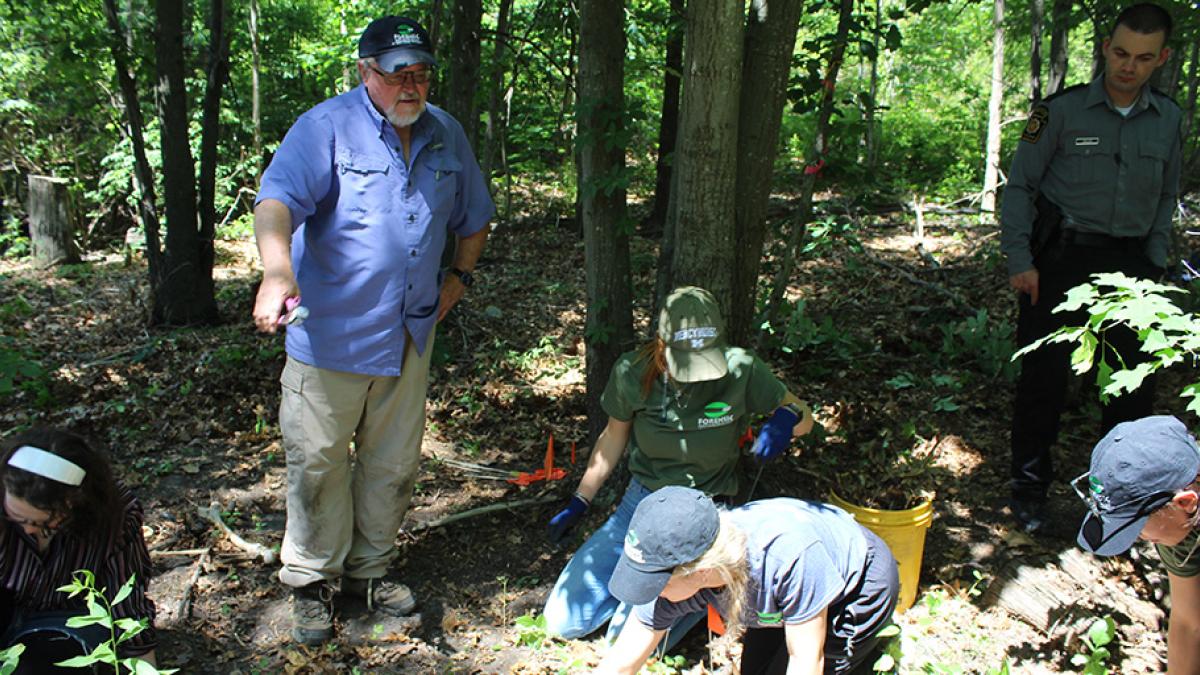Forensic anthropologist's summer: No rest for these investigative bones

The end of the university’s academic year brings a much-deserved reprieve for many faculty members who can now pursue their own research, writing, travel, and assorted projects, typically uninterrupted. Such is not the case for forensic anthropologist Dr. Dennis Dirkmaat. No matter the time of year, the academic schedule, or summer vacation plans, his phone takes no holiday.
In the past two weeks, Dirkmaat and his team of forensic anthropology faculty and graduate students were summoned to assist with four cases. As specialists in the study of the human skeleton, their charge is to help law enforcement, coroners, and medical examiners with the recovery of human remains, particularly through archaeological recovery protocols and interpretation of outdoor scenes.
From there, the team heads to the lab where they analyze the skeletal remains to establish a biological profile and interpret trauma to bone, frequently working with a forensic odontologist to match dental records and provide positive identification. In Mercyhurst’s case, that is Dr. Joe Adserias-Garriga. From there, they may be called to testify in court about their findings.
On June 4, Dirkmaat was in Cambria County Court in Ebensburg where he was testifying in the murder trial of Brian Giles, who was ultimately found guilty of killing his wife, Nancy Giles, in 2018. Dirkmaat and his team had processed the scene, a shallow grave on a hillside, and helped to identify injuries to the remains.
Just days after Giles’ guilty verdict, on June 7, human remains were discovered in the basement of Giles’ former house, and Mercyhurst’s forensics team was again called to the scene. According to news reports, a girlfriend of Giles, Jilly Todaro, was reported missing in 2020 and has not been found. At this point, it is not known whether the body uncovered in Giles’ basement is that of Todaro. The remains have since been transferred to Mercyhurst’s forensics labs, where they are being analyzed.
“That’s the nice thing about summer,” Dirkmaat said. “Our students can work all day on a case and not have to leave for classes. That allows us to turn a case around quicker.”
It also provides an unparalleled opportunity for the six graduate students and three undergraduates who are working part-time with Dirkmaat this summer.
Just recently, the group helped to unseal the mystery of a human skull that was found by a fisherman on May 16 in the Little Conemaugh River in Conemaugh Township. Using dental records, they identified the remains as belonging to Michael K. Theys Jr., who had been missing for a year. The case has now moved from a “missing persons” case to a “suspicious death” investigation.
As chair of Applied Forensic Sciences at Mercyhurst, Dirkmaat has conducted more than 1,200 forensic cases to date. He has participated as a primary forensic anthropologist with the U.S. government’s Disaster Mortuary Operational Response Team, where he assisted with commercial plane crashes, train accidents, and natural disasters. He was also the chief forensic anthropologist at Somerset on Sept. 11, 2001.
In 2021, he received unprecedented recognition from the American Academy of Forensic Sciences by earning both the T. Dale Stewart Award for Lifetime Achievement and its first-ever Outstanding Mentorship Award.
FILE PHOTO: Dennis Dirkmaat teaching students forensic recovery methods.